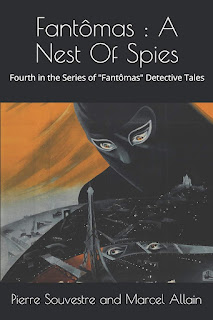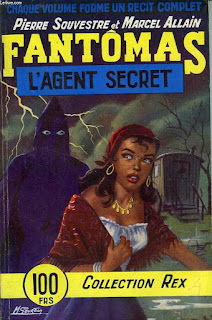Fantômas: A Nest of Spies (originally published in 1911 as L'Agent Secret) is the fourth of the original series of Fantômas novels.
Fantômas is a diabolical criminal mastermind created by French writers Marcel Allain (1885–1969) and Pierre Souvestre (1874–1914). They wrote thirty-two Fantômas novels between 1911 and 1913. Allain wrote several more Fantômas novels in the 1920s. There have been Fantômas movies and Fantômas comics.
Fantômas is to French popular culture what Dr Mabuse is to German pop culture, or what Professor Moriarty is to British pop culture.
Fantômas has two deadly enemies - Inspector Juve and crusading journalist Jérôme Fandor. Juve and Fandor have devoted years of their lives to the project of bringing Fantômas to justice. But Fantômas is like Dr Fu Manchu. Nayland Smith can foil Fu Manchu’s plans and destroy his criminal operations but we know that he will never succeed in destroying Fu Manchu or bringing him to justice. Fu Manchu will always slip away, and he will always rebuild his organisation. And, in the same way, Fantômas will always manage to escape Juve’s clutches.
When this fourth novel opens Fantômas has been quiet for a while. Perhaps he has left France. Perhaps he is dead. Perhaps, after suffering defeat at the hands of Juve and Fandor, he has decided to retire from crime.
This fourth novel begins with a French artillery captain who has fallen hard for a very pretty girl, known to her friends as Bobinette. Captain Brocq has in his keeping certain top secret documents, vital to national security and all that stuff, and he finds to his dismay that one of the documents seems to have vanished. It was there a moment ago, just before Bobinette gathered up some letters of hers that Brocq had been, indiscreetly, keeping. Could Bobinette have gathered up the secret document by mistake along with the letters? That must be the explanation. The other explanation, that Bobinette stole the document, is unthinkable. A sweet young girl like Bobinette could not possibly be a spy. Either way Captain Brocq has to get that document back so he sets off in pursuit of his pretty mistress. And the hapless captain then loses his life in bizarre circumstances.
Inspector Juve is called in to investigate.
Journalist Jérôme Fandor is also taking an interesting in the case. He and Juve are old friends, their friendship being strengthened by their past shared struggles against the arch-criminal Fantômas. Juve sees the hand of Fantômas in the murder of Captain Brocq and it’s true that the bizarre murder method is the sort of thing that would appeal to Fantômas. Fandor however believes it’s just a simple case of espionage, although of course espionage is rarely simple.
There certainly is a vast espionage plot at the back of Captain Brocq’s murder. A number of young French officers have been ensnared by pretty but unscrupulous women. They are drawn into the web of espionage gradually. At first the information they’re selling seems so trivial as to be completely harmless. But soon they are being called upon to sell vital secrets.
Juve and Fandor conduct parallel investigations and at times it has to be said that they find themselves at cross purposes. In addition to the police involvement the military intelligence services (the Second Bureau) are investigating the case. The police and the military intelligence people dislike and distrust one another and are constantly getting in each other’s way. Juve doesn’t like the Second Bureau anyway but in this case he suspects that they’ve been infiltrated by foreign spies or possibly even infiltrated by Fantômas’s organisation.
One of the conventions of pre-First World War crime and spy fiction is that you can’t be a proper great detective or a proper great villain unless you are a master of disguise. The detectives and the villains assume a bewildering range of disguises and nobody ever manages to penetrate those disguises. It’s a convention that some modern readers find off-putting, while others find that it adds a certain period charm. In this novel Allain and Souvestre have their characters assuming so many disguises that one can’t help suspecting that at times they’re being a bit tongue-in-cheek.
The disguises are however vital to the story. It is essential that the relevant authorities should be totally bewildered and it’s essential that even Juve and Fandor should become hopelessly confused. And even Fantômas occasionally gets taken in by disguises assumed by the good guys.
And Fantômas doesn’t just adopt disguises - at times he wears a sinister mask and cloak.
The tone of the novel is one of breathless excitement with an endless succession of unlikely and bizarre events, impossibly narrow escapes and hopeless misunderstandings. Juve and Fandor both manage to get themselves arrested.
There are romantic complications as well. There are several romance sub-plots and naturally the course of true love is beset by endless misunderstandings and deceptions.
The plots of the Fantômas novels are ludicrously contrived. They’re incredibly pulpy. They’re much less sophisticated in a literary sense than Sax Rohmer’s Fu Manchu novels. The Fantômas novels probably had more influence on the world of comics than on the world of pulp fiction. They were a definite influence on the adult-oriented comics that became popular in Europe in the early 1960s (such as the Italian fumetti Neri comics) and a definite indirect influence on 60s movies such as Barbarella and Danger: Diabolik. You could possibly even argue that they had an indirect influence on the Bond movies, especially as the Bond films moved further and further away from realism.
The Fantômas stories are among the foundational texts of modern pop culture. For that reason it is essential to read at lest a couple of them. And once you get into the swing of them they’re great fun.
I also very highly recommend the 1964 Fantômas movie.


No comments:
Post a Comment